Top 10 Most Expensive Tea In The World
Today, we’re looking at the top 10 most expensive teas in the world. Get ready to be inspired! Hello, everyone! Thanks for joining us once again. Today, our top 10 list introduces you to the exquisite world of luxurious teas.
Tea has been a part of oriental traditions for millennia. Europe and the U.S. first developed a taste for these mystical leaves in the 18th century when British traders began smuggling tea seeds from China to their Indian colonies in the Himalayas. In West Bengal, tea plantations replaced opium fields in large numbers, and a new culture was born. This change in harvest is widely regarded as one of the most defining eras in modern international trade.
Today, tea products are ubiquitous, and the choices are extremely diverse—fruity, smoky, herbal, or aromatic. However, the very best tea leaves will always be those grown on mystical grounds, cultivated by ancient methods, and distributed with a touch of class. Let’s dive in!
Types of Most Expensive Tea
1. Black Tea
- Fully oxidized leaves
- Strong, bold flavor
- High caffeine content
- Popular varieties: Assam, Darjeeling, Ceylon, English Breakfast, Earl Grey
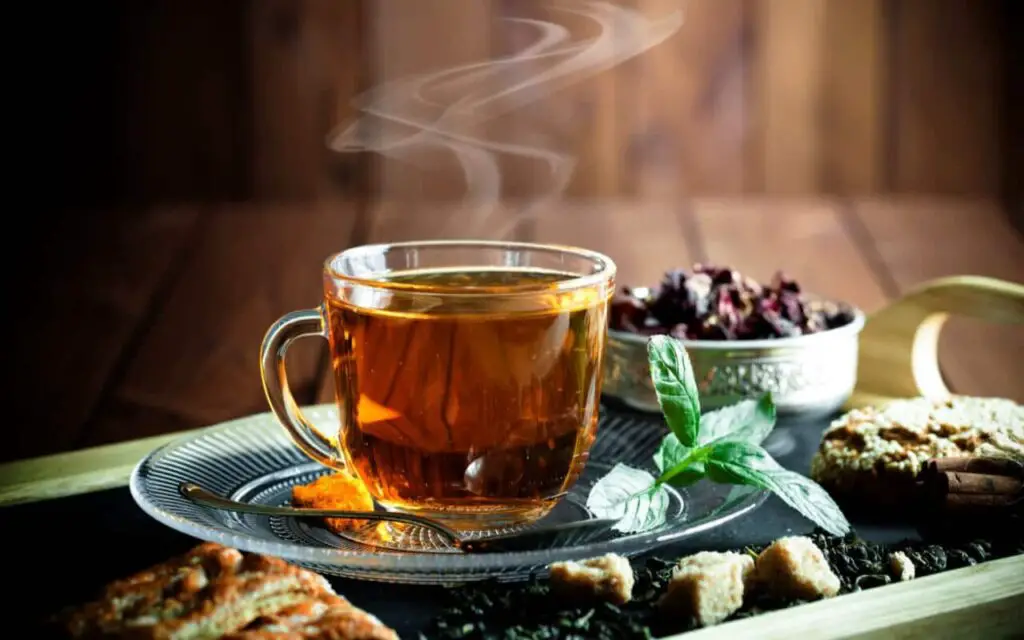
2. Green Tea
- Minimally oxidized leaves
- Light, grassy flavor
- High in antioxidants
- Popular varieties: Matcha, Sencha, Gyokuro, Jasmine Green
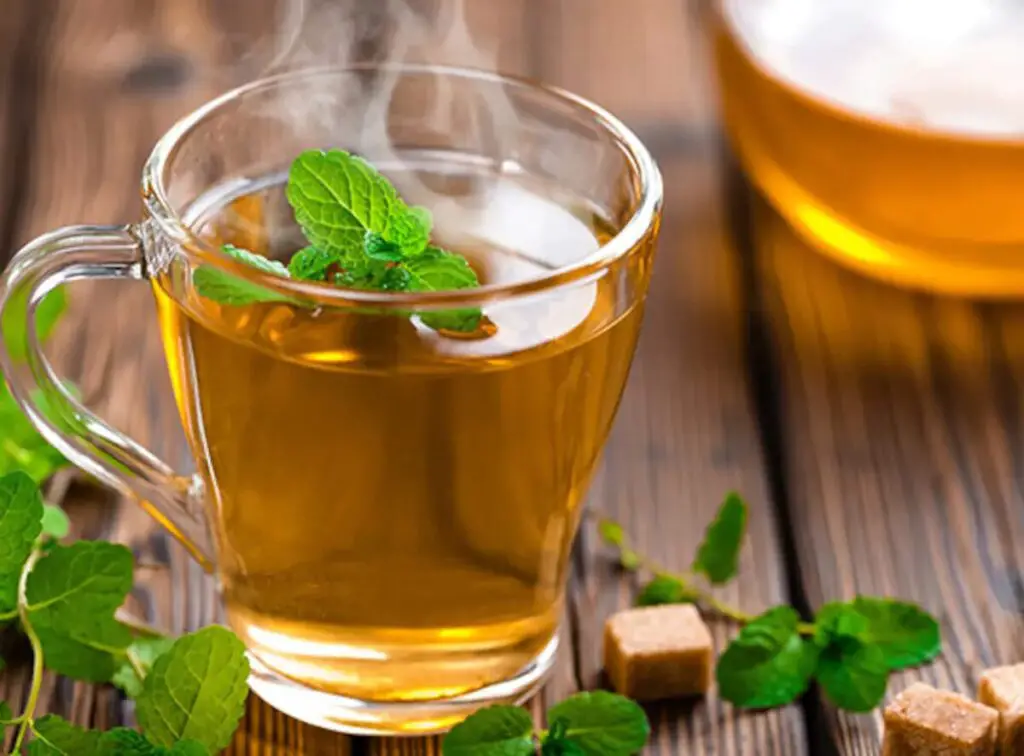
3. White Tea
- Least processed of all teas
- Delicate, subtle flavor
- High in antioxidants
- Popular varieties: Silver Needle, White Peony
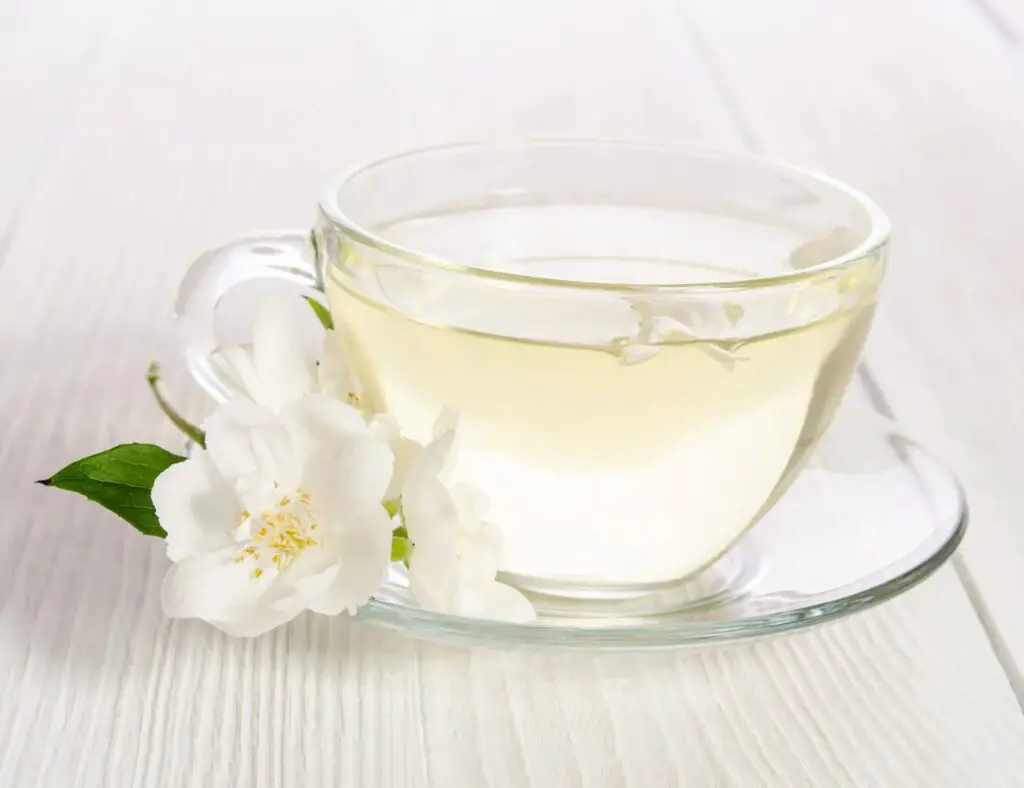
4. Oolong Tea
- Semi-oxidized leaves
- Complex flavor profile
- Can range from light to bold
- Popular varieties: Tieguanyin, Alishan, Da Hong Pao
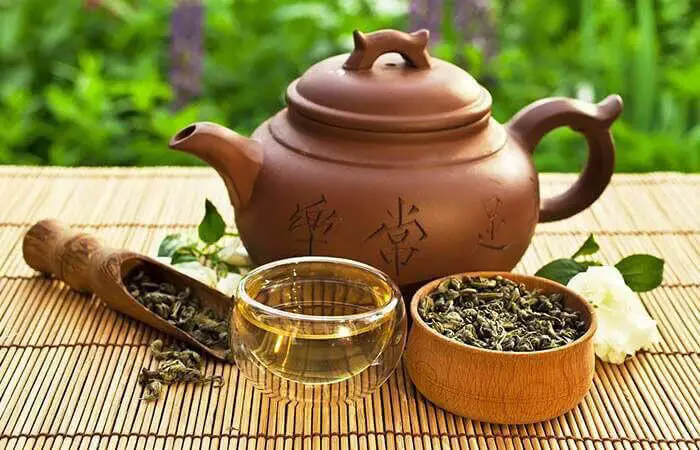
5. Pu-erh Tea
- Oxidized and fermented leaves
- Earthy, unique flavor
- Can be aged for decades
- Popular varieties: Raw Pu-erh, Ripe Pu-erh
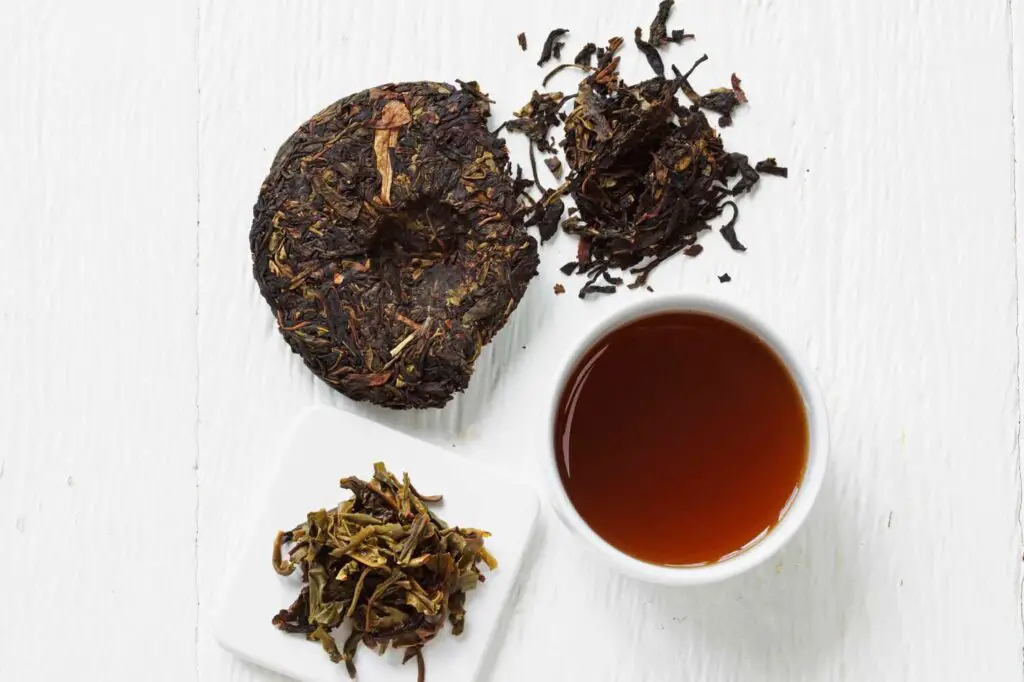
6. Yellow Tea
- Lightly oxidized leaves
- Mild, sweet flavor
- Less common than other types
- Popular varieties: Junshan Yinzhen
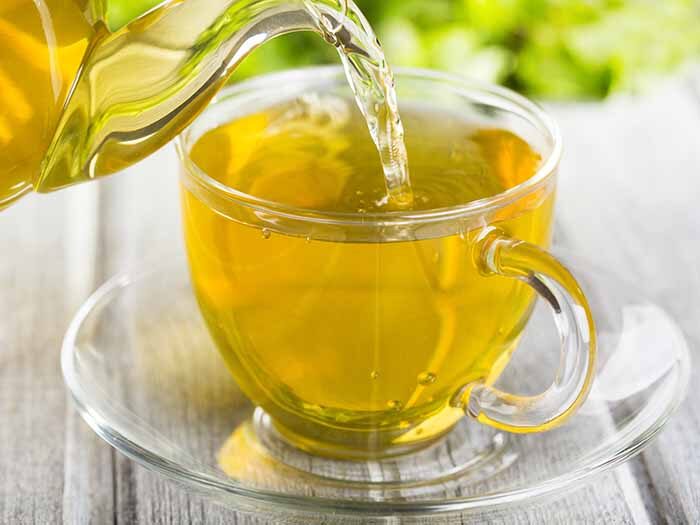
7. Herbal Infusions (Not True Teas)
Herbal infusions, often mistakenly called herbal teas, are made from various plants and do not contain caffeine.
- Common ingredients: Peppermint, chamomile, hibiscus, ginger, rooibos, lavender, fruit
- Popular blends: Calm and relaxing, digestive, immune-boosting
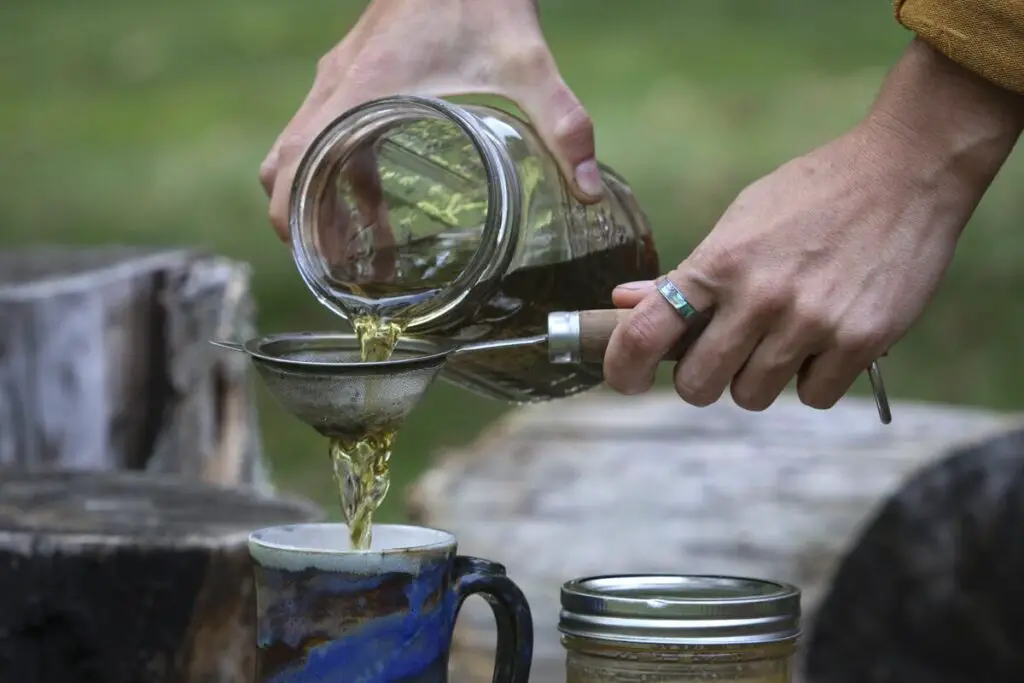
Top 10 Most Expensive Tea In The World
10. Gao Shan Tea
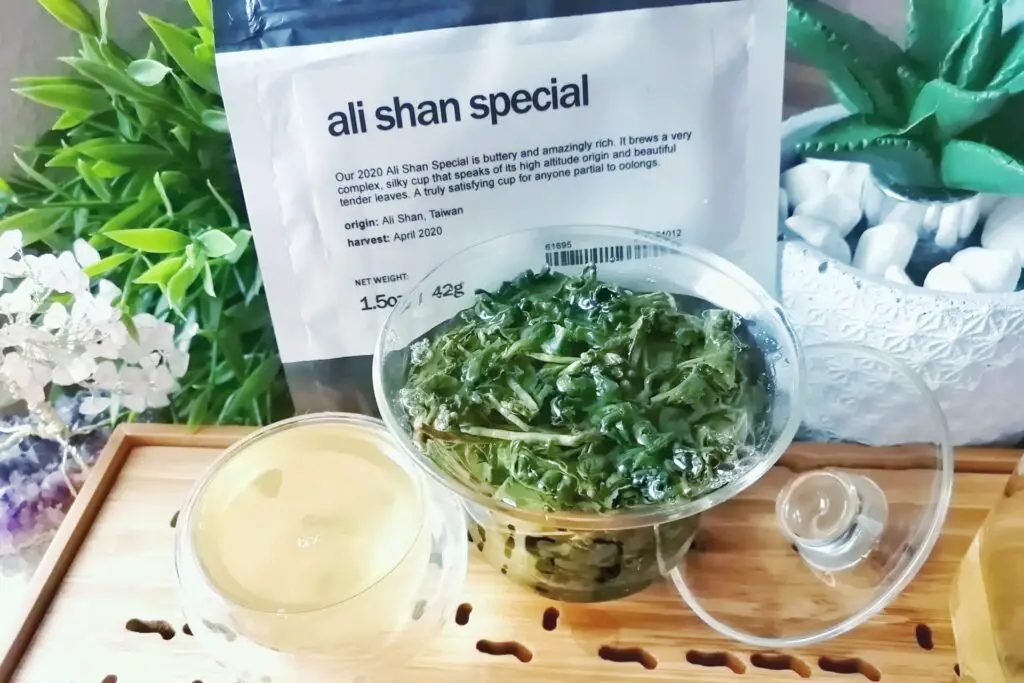
- Tea Price: $170 per kilo
- Tea Brand: Gau Shanti
- Tea Type: Herbal
- Origin: Taiwan
- Benefits: Treats insomnia, skin conditions
- Famous For: Surviving typhoons in rugged mountains
- Why Expensive: Extremely rare and unique medicinal properties
The first tea on our list is both unique and extremely rare. It has survived thousands of years of savage typhoons high up in the mountains of Taiwan. There are fewer than 800 tea plants, and each one must be carefully cultivated.
Chinese legends believe the tea’s medicinal qualities derive from its ability to survive on such rugged terrain. It’s used to treat insomnia, dizziness, and various skin conditions.
9. Silver Tips Imperial Tea

- Tea Price: $400 per kilo
- Tea Brand: Silver Tips Imperial
- Tea Type: White Tea
- Origin: Darjeeling, India
- Benefits: High in antioxidants, anti-aging properties
- Famous For: Harvested during full moon nights
- Why Expensive: Rare harvesting method and mystical aroma
This product grows at the highest altitudes of any tea plantation, as high as 8,000 feet in the Himalayan mountains. Its mystical aroma is attributed to a unique harvesting method—Silver Tips Imperial tea can only be picked during full moon nights by following cosmic cycles. The tea’s potency is apparently enhanced.
After the harvest, the leaves are left out to dry in slightly moist conditions so they begin to ferment. As a result, the product has become known as a liqueur tea, usually enjoyed in the evening after a luxurious banquet. This tea is processed and packaged at the Makaibari Tea Estate in Darjeeling, renowned as the very first tea factory in India and the only one never owned by the British.
8. Garna Broken Leaf Black Tea

- Tea Price: $405 per kilo
- Tea Brand: Garna Broken Leaf
- Tea Type: Black Tea
- Origin: Azores Islands, Portugal
- Benefits: Boosts heart health, rich in antioxidants
- Famous For: Grown in volcanic soil, third-leaf harvesting tradition
- Why Expensive: Unique harvesting method and rare growing conditions
This tea’s history is also linked with a great European power of the Imperial era. The Portuguese were some of the first merchants in Asia, and tea reached the palaces of Portuguese rulers by the 1750s. In 1883, the Garna Tea Plantation was founded on the remote Azores Islands.
The magical destination, formed through volcanic activity millions of years ago, provides the only climate and soil in Europe where quality tea can be grown in abundance. The tea’s harvesting method also makes it unique—farmers only pick the third leaf from each branch. This ancient tradition creates a luxurious and exclusive aroma, a beautiful fusion of East meeting West.
7. Gyokuro Tea
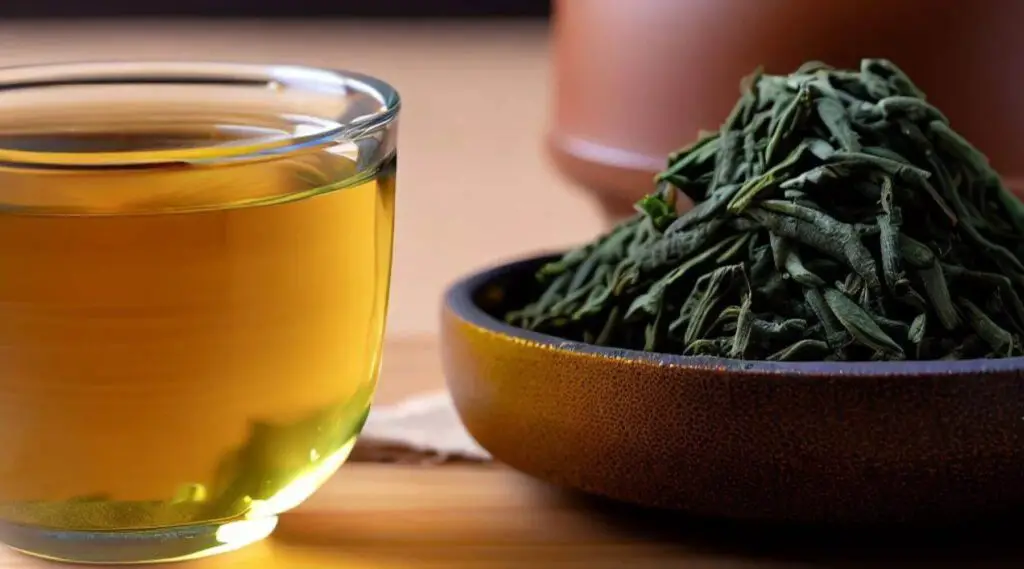
- Tea Price: $650 per kilo
- Tea Brand: Gyokuro
- Tea Type: Green Tea (Sencha)
- Origin: Uji District, Japan
- Benefits: High in amino acids, promotes mental clarity
- Famous For: Shade-grown for a sweeter, more intense flavor
- Why Expensive: Specialized cultivation and traditional harvesting techniques
Gyokuro is a Japanese green sencha tea grown in the Uji district of Japan for as long as history can remember. This is definitely one of the oldest teas on this list. It distinguishes itself from other sencha teas in quality and flavor because of the way it’s cultivated. Usually, green tea leaves are immediately dried in the sun after harvesting.
However, the gyokuro leaves are deliberately dried in the shade for the first two weeks. This raises the amino acids and alkaloid caffeine, giving the tea a stronger, sweeter taste. These unique properties also mean that gyokuro tea is widely regarded as a form of alternative medicine. Rich Japanese grandmothers are known for trying to cure the common cold with gyokuro tea—it’s a bit more expensive than pharmaceutical medicines but far more classy.
6. Taiwanese Insect Poop Tea

- Tea Price: $1,000 per kilo
- Tea Brand: Taiwanese Insect Poop Tea
- Tea Type: Oolong
- Origin: Taiwan
- Benefits: Improves digestion, unique flavor profile
- Famous For: Made from insect droppings
- Why Expensive: Labor-intensive harvesting and unique production method
The Taiwanese are serious about tea, and this product, in particular, is fiercely respected. Perhaps the most bizarre tea on this list, its cultivation methods are distinctly unique. Tea leaves are collected and piled together in a heap, then a hoard of larval insects, similar in appearance to silkworms, are dumped on top. The larvae gradually devour the pile of leaves.
Of course, what goes in must come out, and it’s these droppings that the tea is actually made from. One reason it’s so expensive is because harvesting it is more labor-intensive than any other plant on the planet—farmers must use specialized tweezers and magnifying glasses to painstakingly pick up each dropping. The myth behind this tea is also worth a mention—it was said to be cultivated by accident in the 18th century when local farmers tasted the insect poop. They were convinced it was a special product and sent some to the Chinese emperor as a gift.
5. Yellow Gold Tea Buds
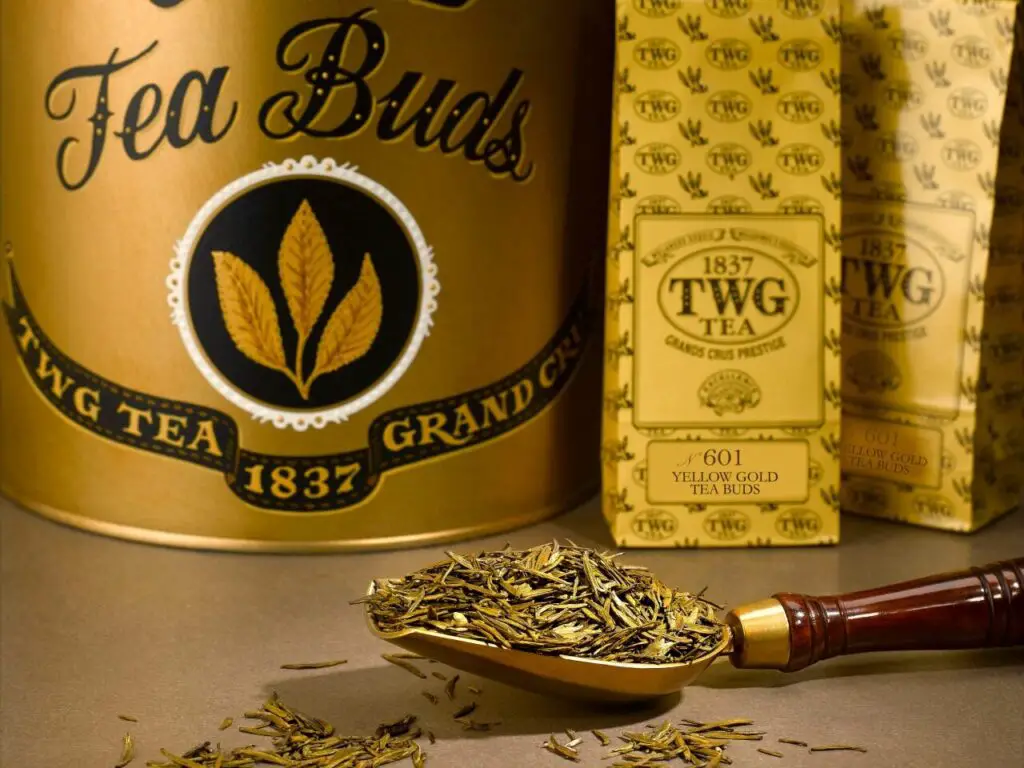
- Tea Price: $3,000 per kilo
- Tea Brand: Yellow Gold Tea Buds
- Tea Type: Yellow Tea
- Origin: Singapore
- Benefits: Promotes skin health, rich in polyphenols
- Famous For: Hand-painted with 24-carat gold
- Why Expensive: Luxurious production process and limited availability
This product perfectly represents the region from which it comes—all the ostentatious glitz and glamour of Singapore is reflected in this tea, refined with superfluous luxury. This is literally the Gucci of teas. The tea only exists on one mountain, and harvesting of the buds is restricted to one day per year. Trusted farmers use golden scythes to pick the buds that only grow on the very tops of the trees.
After being picked, the buds are placed in containers to dry at a higher temperature. This increases the amount of polyphenol, causing the leaves to turn yellow. Once dried, the leaves are hand-painted by skilled artisans with 24-carat gold. The tea company defends this level of ostentation by saying the gold is not just decorative—indeed, ancient Chinese medicine considers gold to be a special dietary supplement with profound health benefits. So don’t worry, if the gold markets crash, you can always store the metal on a spice rack.
4. Guan Yin Tea
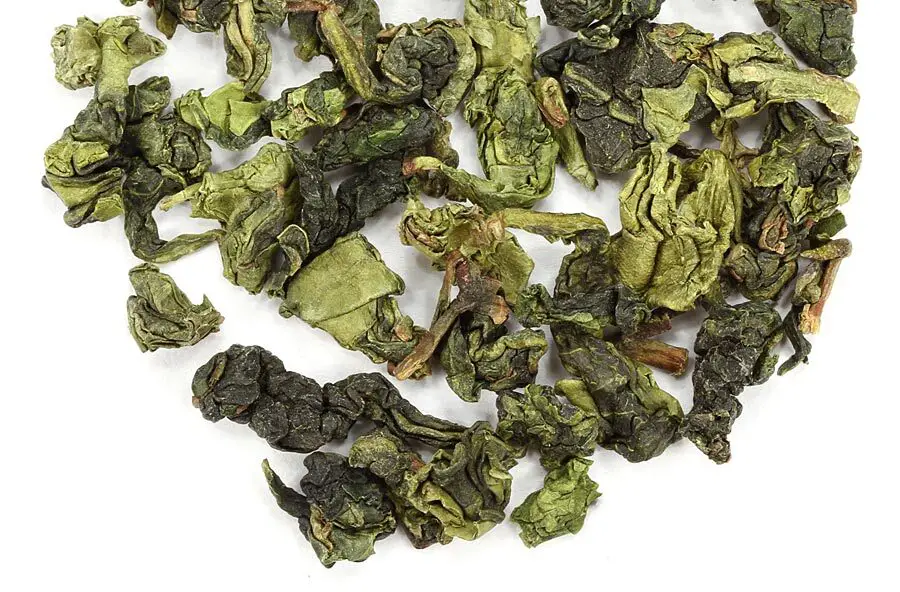
- Tea Price: $3,000 per kilo
- Tea Brand: Guan Yin
- Tea Type: Oolong
- Origin: Fujian Province, China
- Benefits: Promotes relaxation and well-being
- Famous For: Named after the Iron Goddess of Mercy
- Why Expensive: Deep-rooted spiritual and cultural significance
Tied in price with the Yellow Gold Tea Buds of Singapore, this tea’s ancestral past could not be more different. The origins of Guan Yin tea are steeped in folk legend and hallowed by spirituality. Legend has it that the tea was discovered over a thousand years ago by a peasant farmer in the Fujian province of China. Every day on his way to the fields, he would pass a temple built in honor of Guan Yin, the Iron Goddess of Mercy.
The Fujian region was extremely poor at this time, and no one had money to maintain the temple, which had fallen into disrepair. The peasant farmer became despondent by this fact and resolved to do all he could to maintain the building—he would sweep it clean and light incense.
One night, the goddess Guan Yin visited him in a dream and thanked him for all his hard work. She told him that a gift had been left at the back of the temple. The farmer found the tea shoot and began to cultivate it. It soon gained popularity as one of the finest teas in China. As a result, the peasants were raised out of destitution and into remarkable prosperity. Even to this day, every year a festival is held in honor of the tea and the Iron Goddess of Mercy.
3. Suhas ERT Tea
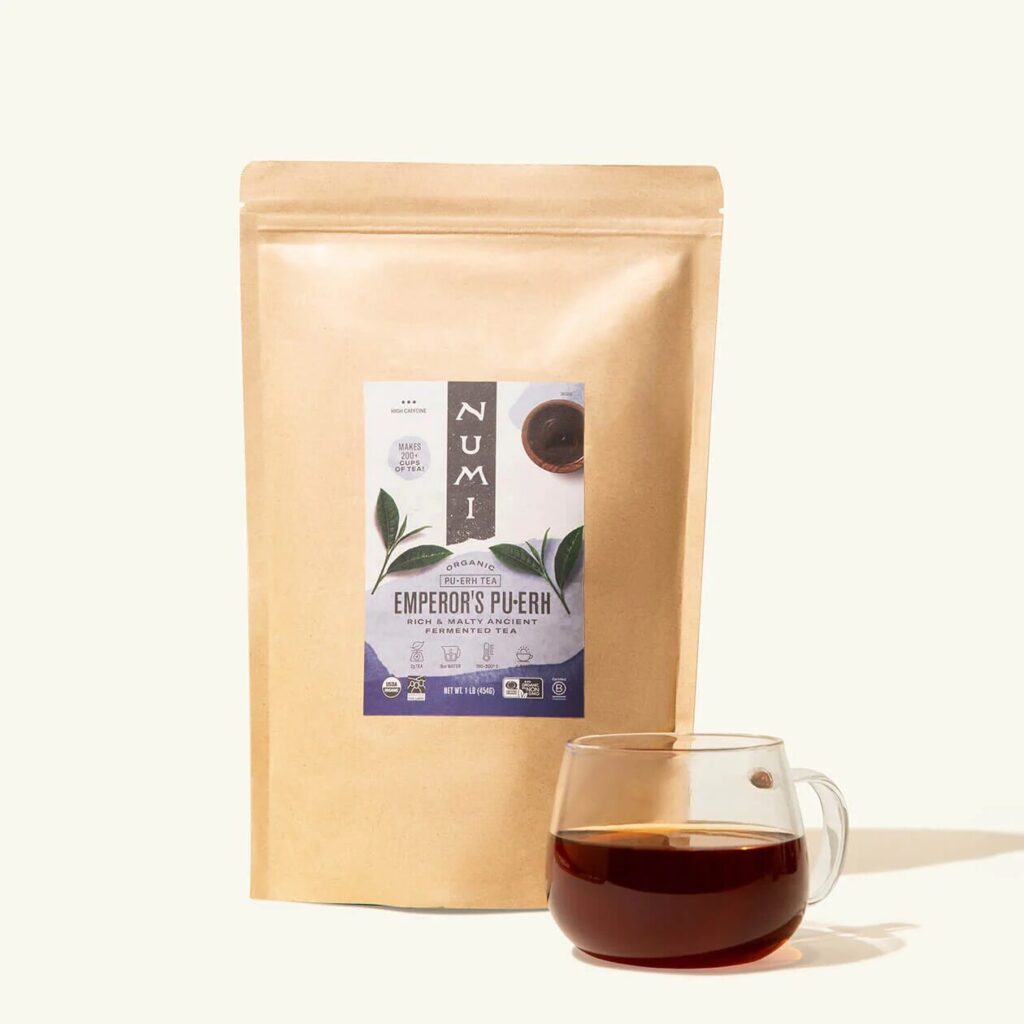
- Tea Price: $6,500 per kilo
- Tea Brand: Shu-Haiyan
- Tea Type: Oolong
- Origin: China
- Benefits: Calming effect, antioxidant-rich
- Famous For: “Water Sprite” or “Narcissus” tea with a mystical aroma
- Why Expensive: Rarely exported outside China, revered for its quality
The mysterious nature of this oolong tea gives it a magical quality, making it unparalleled in popularity and reputation in China. Suhas ERT loosely translates to “Water Sprite” in English. The tea is widely known as Narcissus tea. The coincidental link between the Chinese and English names is quite extraordinary. The Chinese name originates from a story about water sprites who punished a vain man by drowning him in a cup of tea.
When brewed, Suhas ERT turns perfectly black with a wickedly enticing aroma. The color is so fine it creates a perfect reflection. In ancient Greek legend, Narcissus is the main character who drowns in a lake trying to kiss his own reflection. This tea is rarely exported outside of China and is mainly used in the country’s most expensive restaurants. Do you know what is most expensive fruits In the world?
2. Panda Dung Tea (
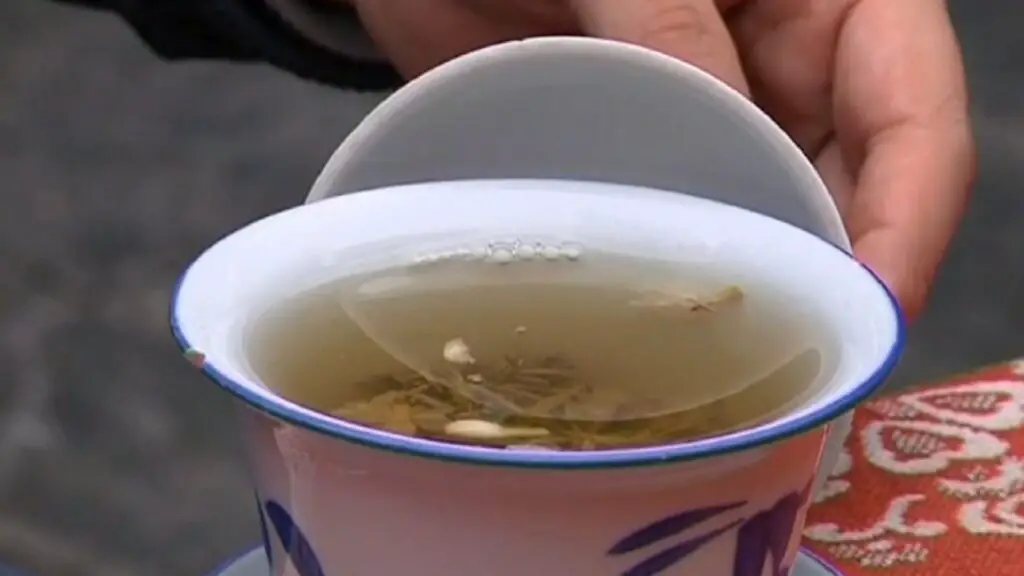
- Tea Price: $70,000 per kilo
- Tea Brand: Panda Dung Tea
- Tea Type: Green Tea
- Origin: Szechuan Province, China
- Benefits: Rich in nutrients, eco-friendly production
- Famous For: Unique fertilization method using panda dung
- Why Expensive: Limited production and eco-conscious cultivation method
This modern tea is cultivated in the mountainous regions of the Sichuan province in northern China, which is the most expensive green tea in the world. The product first came onto the market in 2012 and represents an entirely new concept behind the purpose and function of tea cultivation. The region is home to some of the last remaining panda bears in the world. One of the reasons panda bears have become so endangered can historically be attributed to agricultural expansion.
However, the philosophy of this tea company hopes to reverse the process. The plantations are entirely self-sustainable and create zero waste. Pandas are free to roam through the tea plantations and are encouraged to use them as toilets. This fertilization technique creates a strong dark tea with fresh aromas. The tea is sold at high prices due to its quality but also for its efforts to conserve the natural environment. How wonderful that you can sit at home with a $200 cup of Panda Dung Tea, knowing that every luxurious sip helped save a panda bear’s life.
1. Da Hong Pao Tea
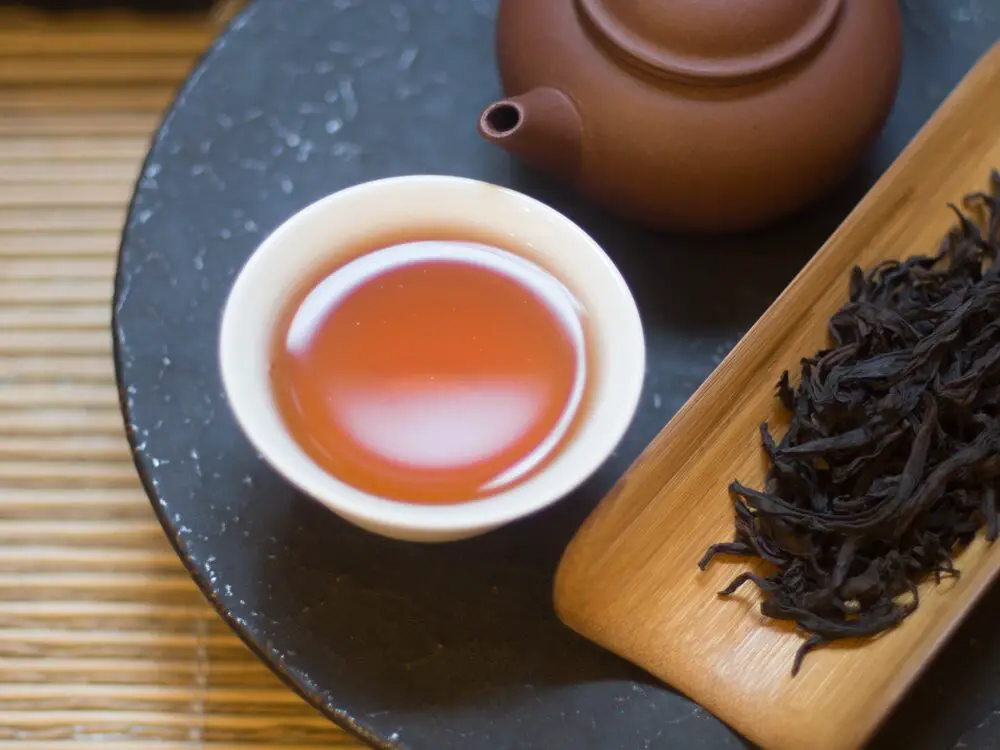
- Tea Price: $1,000,000 per kilo
- Tea Brand: Da Hong Pao
- Tea Type: Oolong
- Origin: Wuyi Mountains, China
- Benefits: Boosts energy, aids digestion
- Famous For: Legendary origins, healing properties
- Why Expensive: Made from ancient, protected tea bushes; extremely rare and highly coveted
Coming in at number one is the tea of all teas. Da Hong Pao Tea estimated that unless you’re extremely well-connected in China, the chances of tasting this tea are one in 494 billion. Legend has it that thousands of years ago, a Chinese emperor’s mother was critically ill. Some peasants from the Wuyi Mountains offered him some tea that they said was blessed and could cure his mother’s illness.
The remedy worked, and the entire empire was astonished. Immediately, the Emperor asked for the whereabouts of the bushes that produced this miraculous blend. The name Da Hong Pao literally translates to “Red Robe” because upon finding the six bushes, a soldier took off his red robe and cast it upon the shrubs, claiming it for the Emperor.
Today, the six bushes still exist and are a national treasure of China. Day and night, heavily armed guards keep watch over the plant, which is worth twenty times its weight in pure gold.
And that’s a wrap on the world’s most expensive teas!
Top 10 Most Expensive Tea Brands in 2024
Sure! Here’s a detailed table of the most expensive tea brands in 2024:
| Rank | Tea Brand | Type | Origin | Price (per pound) |
|---|---|---|---|---|
| 1 | Da-Hong Pao | Oolong | Wuyi Mountains, China | $544,310 |
| 2 | Panda Dung Tea | Green | Ya’an, Sichuan, China | $31,751 |
| 3 | Yellow Gold Tea Buds | Yellow | China | $3,538 |
| 4 | Makaibari Silver Tips Imperial Tea | White | Darjeeling, India | $839 |
| 5 | Gyokuro | Green | Japan | $650 |
| 6 | Vintage Narcissus Tea | Oolong | Wuyi Mountains, China | $650 |
| 7 | Badamtam Moonlight White Tea | White | Darjeeling, India | $600 |
| 8 | Silver Tips Imperial Tea | White | Darjeeling, India | $400 |
| 9 | Tienchi Flower Tea | Herbal | China | $300 |
| 10 | Dragon Well | Green | Hangzhou, China | $250 |
These teas are renowned for their rarity, unique flavors, and the meticulous craftsmanship involved in their production.
Do you have a favorite type of tea or are you looking to try something new?
Conclusion
Thank you for sticking with us all the way to the end. And for doing that, you know you get a bonus! Here it is: The tea trade was successful as it managed to break the shady opium trade that was going on between China and Britain by introducing an entirely new international market. Opium addiction decreased drastically in Europe, contributing to a healthier society.
FAQ’s
What is the most luxury tea?
The most luxury tea is Da Hong Pao, often referred to as the “Tea of Emperors.” It’s known for its rich history, legendary origins, and an unmatched level of prestige. A single kilogram of Da Hong Pao can fetch up to $1,000,000.
Why is Da-Hong Pao so expensive?
Da Hong Pao is so expensive because it comes from six ancient tea bushes that are considered national treasures in China. These bushes are heavily guarded, and the tea produced from them is extremely rare. The legend surrounding this tea, along with its limited availability, contributes to its astronomical price.
Which is the best tea in the world?
Da Hong Pao is so expensive because it comes from six ancient tea bushes that are considered national treasures in China. These bushes are heavily guarded, and the tea produced from them is extremely rare. The legend surrounding this tea, along with its limited availability, contributes to its astronomical price.
What is the rarest tea?
The title of the “best tea in the world” often goes to Da Hong Pao due to its unparalleled quality, rich flavor, and deep historical significance. However, other teas like Silver Tips Imperial and Gyokuro are also highly regarded for their unique qualities.